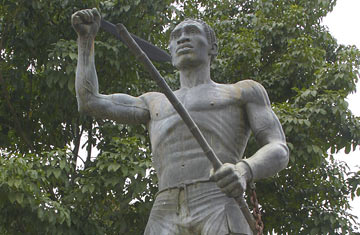
Gaspar Yanga was a leader of a slave rebellion in Mexico during the early period of Spanish colonial rule
The first town of freed African slaves in the Americas is not exactly where you would expect to find it — and it isn't exactly what you'd expect to find either. First, it's not in the United States. Yanga, on Mexico's Gulf Coast, is a sleepy pueblito founded by its namesake, Gaspar Yanga, an African slave who led a rebellion against his Spanish colonial masters in the late 16th century and fought off attempts to retake the settlement. The second thing that is immediately evident to vistors who reach the town's rustic central plaza: there are virtually no blacks among the few hundred residents milling around the center of town.
Mirroring Mexico's history itself, most of Yanga's Afro-Mexican population has been pushed to neighboring rural villages that are notable primarily for their deep poverty and the strikingly dark skin of their inhabitants. Mexico's independence from Spain and new focus on building a national identity on the idea of mestizaje, or mixed race, drove African Mexicans into invisibility as leaders chose not to count them or assess their needs. Now many blacks want to fight back by improving the shoddy education and social services available to them and are petitioning for the constitution to recognize Afro-Mexicans as a separate ethnic group worthy of special consideration.
"The two races that are most discriminated against here are the blacks and the indigenous — but it is more accepted against blacks," says Hemeregildo Fernandez, a doctor in Yanga and one of the few blacks still living in town. His office is tucked on a narrow street that juts off the main square, where the rotund man with warm brown skin and salt-and-pepper hair receives a fluctuating stream of patients. The majority of the black Mexican population works in agriculture, fishing or construction, and while, like Fernandez, some have achieved notable positions in coastal towns, he says, "Most blacks have no economic power."
Many of the country's mexicanos negros (black Mexicans), as they are called, know that their ancestors arrived in chains on boats that docked at ports in the sultry, steamy state of Veracruz. But they don't know much else. Indeed, Afro-Mexicans say that much of the history of los mexicanos negros is untaught or ignored by the rest of the country. Apart from Yanga, Afro-Mexicans claim Vicente Guerrero, who served briefly as President in the early 19th century and gave his name to the state of Guerrero, as one of their own, as well as revolutionary José María Morelos, who was executed by the Spaniards in 1815.
Black Mexican activists estimate the population of Afro-Mexicans at about 1 million, but there are no official figures. Earlier this year, they petitioned the National Institute of Statistics and Geography to include the Afro-Mexican population as a separate category in the next census, in 2010. Official statistics do not recognize blacks as a separate ethnic group (56 indigenous groups are officially accredited, the largest ones being the Nahuatl and the Maya, numbering more than 2 million each). As a result, Afro-Mexicans say they have been left out of institutional programs and are without a cultural identity. The group Mexico Negro A.C. is linking with similar Afro-descendant organizations in Latin America that have achieved success in securing better treatment. "We no longer want to be detained by security agents in our own country who say that in Mexico there are no blacks," says Rodolfo Prudente Dominguez, an activist with Mexico Negro.
The Afro-Mexicans face considerable hurdles. Prevailing stereotypes paint the group as happy to live the simple life apart from the rest of society, with no interest in education. The all-black shantytowns near Yanga lack schools, and eager young migrants who move to bigger cities for work complain of blatant discrimination. A report released late last year by Mexico's Congress said that roughly 200,000 black Mexicans who reside in the rural areas of Veracruz and Oaxaca and in tourist cities like Acapulco are out of the reach of social programs like employment support, health coverage, public education and food assistance.
Afro-Mexican culture expert Luz Maria Montiel acknowledges that blacks are particularly marginalized and excluded, to the point that it is impossible to find any mention of them in official records. Yet she argues that it is impractical for blacks to seek constitutional recognition. "It would be impossible to make a law for each of the populations that make up our multicultural nation," she says. Dominguez disagrees: "We are a totally different cultural group from indigenous groups and mestizos of our country, with a particular lifestyle and characteristics that do not respond to public policies that are designed for indigenous groups."
